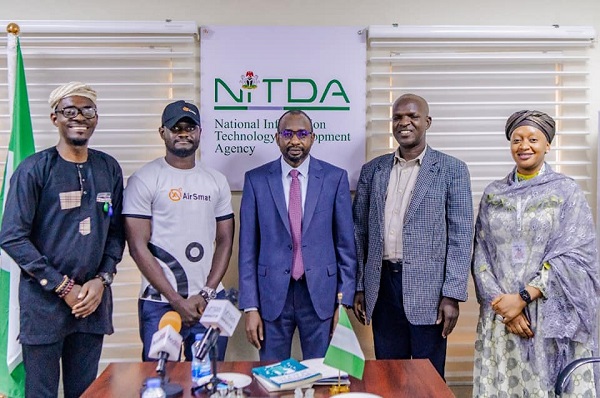
The director-general of the National Information Technology Development Agency (NITDA), Mallam Kashifu Abdullahi has hailed disruptive technologies as a vital part of agricultural development in Nigeria and ensures it contributes significantly to the nation’s gross domestic product.
He made this assertion when he received the co-founder of Corporate Farmers International (CFI), Mr. Akinwale Alabi and his team to the agency’s corporate headquarters in Abuja.
Abdullahi maintained that disruptive innovation using emerging technologies will create new markets and easy access to new products and services.
“There is a need to build this equipment locally by challenging our startups and tech gurus to come up with solutions to such problems. The agency has a Fab-Lab to check the product initiated through a proof-of-concept test. It then proceeds to the fabrication of the product to create a prototype for testing and, later, mass production,” he said.
The NITDA boss pointed out that there is a need to create a value chain. “Creating a platform to bring the farmers, up takers and financial institutions together to ease the purchase of goods and services without leaving your destination. Instead, all you need is to place a request on the platform, requesting the logistics company to pick up and deliver [to the point of initiation].
“NITDA launched National Adopted Village for Smart Agriculture (NAVSA) programme to boost the capacity of young Nigerian farmers in the digital market. NAVSA seeks to digitally transform the agricultural economy of farmers and their business models across all value chains to increase productivity.”
The NAVSA pilot programme was launched at the Federal University of Agriculture Abeokuta, (FUNAAB), Ogun with 100 young farmers and at the Federal University of Duste (FUD), Jigawa, respectively, to create jobs directly and indirectly.
He stressed that the NITDA Strategic Roadmap and Action Plan (SRAP) 2021 -2024 is a document crafted by the agency, a blueprint to evolve Nigeria into a sustainable digital economy that is prosperous and tech-driven. He stated that SRAP has been tailored to proactively facilitate the country’s transformation into a sustainable digital economy but requires an elaborate stakeholder collaboration in implementing the National Digital Economy Policy and Strategy (NDEPS) for a digital Nigeria.
Abdullahi highlighted that NITDA’s SRAP has seven pillars, namely; developmental regulation, digital literacy skills, digital transformation, digital innovation entrepreneurship, cybersecurity, emerging technologies and promotion of indigenous content development.
According to him, the pillars will foster dynamic regulatory instruments that will unlock opportunities across different sectors of the economy, enable the development of digital skills of Nigerians across different walks of life, provide a robust digital platform to drive digitalisation processes in the digital economy and enable innovation-driven small and medium enterprises to thrive. We expect that the outcome of this pillar will create opportunities for job creation.
He cited that cybersecurity will strengthen cyberspace and reduce vulnerabilities exploitable by threat actors to create a vibrant digital economy and protect the digital asset and allow citizens to have confidence in the digital economy.
The NITDA helmsman added that emerging technologieswill facilitate the mapping and development of the digital economy with sustainable development goals in providing quality education, poverty eradication, good health and well-being, and reducing inequalities.
“Promotion of indigenous contentwill create an enabling environment for promoting and adopting indigenous innovation for a digital economy, develop indigenous products and services, increase patronage and enable iterative problem-solving by indigenous digital technology,” he added.
Earlier in his remarks, Alabi said the company is known for innovation around the agricultural ecosystem, building technologies and rendering solutions for the system at large to boost the production of agricultural produce.
“Our major focus is building young entrepreneurs and youth talents that will shape the narrative of agriculture and build a new system that will take Nigeria’s agricultural system to the next level.
“I want to commend the DG of NITDA for the giant strides, interventions, programmes and the launch of the digital agricultural strategy that concentrates on the agricultural sector. Taking advantage and being part of the enterprise document will change people’s perception of farming in the country,” he stated.
Alabi further revealed that it developed a system that speaks about agricultural digital e-learning for young entrepreneurs to plug in quickly and learn easily across the agricultural value chain. This was done in 2022 at the peak of the Covid-19 pandemic. This, he said, has helped many farmers gain knowledge about agricultural activities and changed their perceptions of farming.


